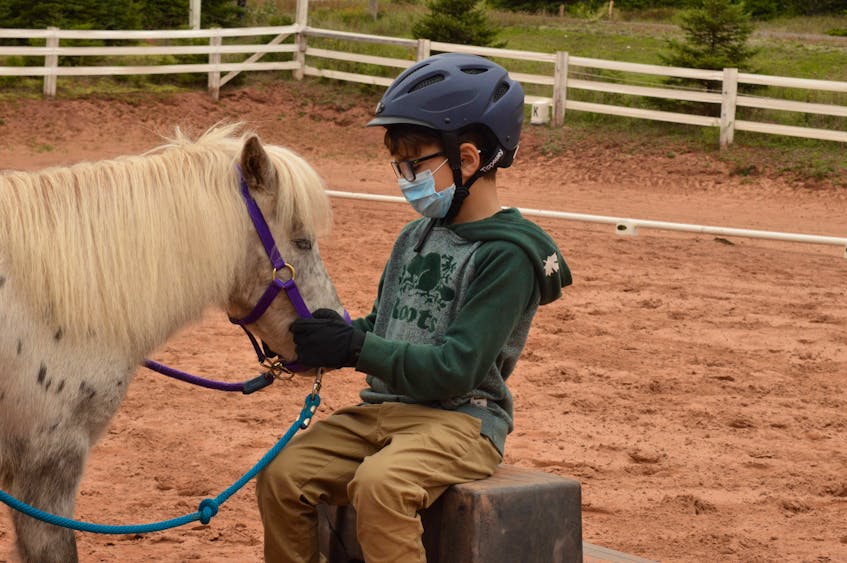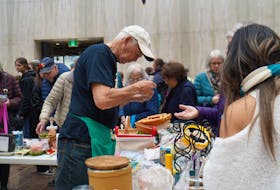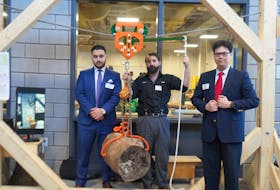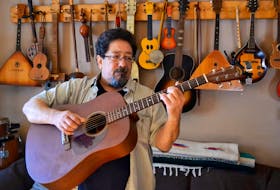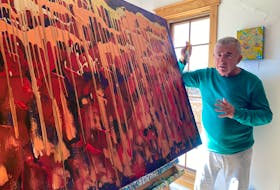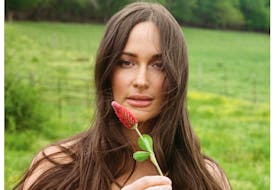HUNTER RIVER, P.E.I. — Emily Craig sits confidently atop Henry the horse as together they trot around the indoor arena.
The red dirt muffles Henry’s hoof beats, and his ears are perked to listen for the next command.
“Woah,” said Craig, accompanying the command with subtle body adjustments.
Henry eases to a stop.
“That was a good one,” she said to her riding instructor.
The 31-year-old is one of the Joyriders taking lessons in Hunter River. The registered charity provides riding lessons for adults and youth with disabilities or unique needs.
Craig, who has difficulty walking, rides Henry when she comes for lessons.
“He’s gentle and kind. He listens to me very well.”
Making changes
There was a time earlier this year when Joyriders president Daphne Davey wasn’t sure anyone would be back in the saddle due to the COVID-19 pandemic.
However, after weeks of thinking and planning, the board came up with adaptations that would alow a few summertime activities and a continuation of lessons in the fall and winter.
For example, instead of two riders in the ring at once for a 10-week session, there is just one rider in the ring, and lessons only run five weeks.
“It’s a compromise, but we can handle that,” said Davey. “It’s better than nothing.”
They’ve also established a one-way traffic flow through the barn, entering by one door and leaving by another. In addition, parents aren’t allowed to watch the lessons, all the volunteers must wear a masks and gloves at all times and the riders, in addition to the usual safety equipment like a helmet and safety belt, must wear a face shield and mask, if possible, and gloves.
“We had to learn the rules off the top of our heads and stick to it,” said Davey.
The pandemic also put a stop to the group’s bi-annual fundraiser, though Davey said the group is financially comfortable heading into 2021 after some grants and donations came in.
Working as a team

In the ring, head instructor Kathryn Barrett stands in the middle of the ring giving instruction and guidance to Craig.
All Joyriders wear a belt with handles around it, just in case someone needs a steadying hand, and all are accompanied around the ring by several volunteers. For Craig, Patti MacLeod holds a lead rope to offer neutral control, while Taylor MacKenzie and Erin Martin jog alongside as side walkers.
On the sidelines, Doug Ellis observes the lesson, making notes that will eventually be included in feedback for volunteers.
Craig and her team circle the ring together at first, side walkers ready to step in if needed, but it’s clear Craig had Henry well in hand.
By the end of the lesson, Craig is circling the ring with just MacLeod loosely holding the lead rope.
Encouraging comments resound as horse and rider come to a smooth halt.
“It feels good to do stuff on your own,” said Craig. I have the best time when I come.”
Outside, Ethan Chaisson, 9, is brushing Bobbi, a miniature horse.
Even though Ethan lives with balance and communication difficulties, he’s fast friends with Bobbi.
“The connection is phenomenal,” said Karen Thompson, who has been volunteering with Joyriders for 10 years.
She holds a box of brushes while Ethan brushes and pats Bobbi.
Ethan is learning how to approach Bobbi and tune in to the animal’s cues, as well as how to care for him.
After brushing, Ethan and Thompson check Bobbi’s hooves, lifting each one in turn.
Once the horse’s coat is shiny and his hooves are free of debris, the two buddies head into the outdoor paddock for a workout.
This one-on-one time is another COVID-19 adaptation. Ethan hasn’t seen Bobbi since 2019, having missed out on a camp that would have seen several Joyriders, two miniature horses and accompanying volunteers in the paddock at once.
Fast facts
Joyriders is a member of the Canadian Therapeutic Riding Association (CanTRA). Founded in 1980, CanTRA has more than 80 member centres across Canada and promotes challenge, achievement and empowerment for children and adults with disabilities through the use of the horse.
Benefits of therapeutic riding:
- Development of mobility, balance and co-ordination
- Improvement of muscle tone and strength
- Increased concentration and improved learning skills
- A challenging recreational activity
- Independence, integration and a sense of achievement
- Development of self-confidence and motivation
Meeting challenges

Adapting is what the Joyriders do.
“Everything is geared to that one rider,” said Davey,
In specially designed cupboards next to the ring, she pulls out coloured reins and saddles of all shapes and sizes, as well as various other items designed so volunteers can make sure each rider’s needs are tailored to the same horse.
Based on Barretts' Farm in Hunter River the Joyriders are part of the Canadian Therapeutic Riding Association.
The club collaborates with two volunteer physiotherapists who help the riders figure out what works for each rider in the saddle. All of the volunteers who help out in the ring have special training as well.
The benefits are many, for the rider and the volunteers.
The riders learn balance, strengthen muscles, gain confidence and, of course, have fun, said Davey.
“They’re learning an awful lot of cognitive things too,” she said and explained riding takes a combination of actions happening all at the same time. “A horse responds to a co-ordinated rider.”
When she sees a rider after weeks of lessons it’s easy to spot the improvements in horsemanship.
“It’s awesome, it really is, especially the self-confidence. …. Once they have self-confidence, it blows their whole world up,” said Davey. “What they’re learning here is having an impact out in the community. That’s very encouraging.”
Outside, Ethan leads Bobbi over and around a variety of obstacles.
Carefully, trusting the little human as his side, Bobbi steps over logs, around pylons and up to a step.
Ethan takes a seat and Bobbi places his forehead against Ethan’s chest. The little boy wraps his arms around the horse’s head.
“That’s a big part of what it’s all about, right there – the hugs,” said Karen.

